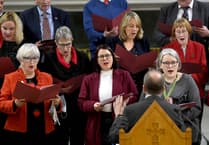Outsiders are often surprised to learn that a place as small as the Isle of Man has its own parliament and government.
And they are astonished to hear that a population of 84,000 also supports no fewer than 22 local authorities.
We should ask ourselves what they ask: Why does a tiny island that has a fully functioning government need any local authorities at all?
This fundamental question is a good starting point for any discussion of the future of our Lilliputian local government arrangements.
The issue is returning to the agenda with the recent launch of a consultation on modernising the rating system, which has got people talking again about the wider structure.
So what is the point of local authorities in the 21st century Isle of Man?
The onward march of progress, extending as far as Ronague and Regaby, has made the island much smaller than it was in the Victorian era, when the patchwork quilt of parochial governance was created.
Even so, the island is still made up of a number of distinct regional communities, defined most basically in terms of north, south, east and west.
The argument for local government is that certain public services are more effective and accountable if they are owned and funded at community level. Raising revenue on a local basis can also help to keep central taxes down.
A case can be made, then, for some form of local government, provided it meets the criteria of public acceptability.
A worthwhile system should be fair, provide value for money, and make a significant contribution to island life. The current hotchpotch falls far short of these standards, with its jumble of different types and sizes of authority, random rates bills, fragmented or duplicated responsibilities, and minimal economies of scale.
Inefficiency in the field of refuse collection, for example, has given the Isle of Man more bin wagons than places many times larger. This is good news for the suppliers of bin wagons but a surprising achievement for the world’s only biosphere nation.
Confusion makes it difficult for people to see the relevance of local government, so they tend not to engage. It can be a struggle to attract candidates, let alone voters, in commissioners elections.
When there is no competition for seats on a local authority, the quality of its membership can be inconsistent, to put it politely. Some members are sensible, public-spirited citizens doing good work for their community. Others make Dibley Parish Council look like The West Wing.
The status quo is dysfunctional and provides us with a weak and sickly version of local democracy. Why has something so untenable proved almost impossible to replace?
Partly because reform proposals have been seen as matters to be accepted or rejected by the local authorities themselves, as if they were the owners of the structure.
Instead of appealing to the public as the funders and customers of the system, previous initiatives have sought permission for change from the service providers.
Hence the futile attempt to find a formula for restructuring that would win consensus support across all the local authorities.
The authorities can be vocal as well as politically influential in MHKs’ constituencies. But they are not the only stakeholder in this debate, nor the most important. They are the product of legislation and not sovereign entities, despite the delusions of Onchan nationalists.
The structure of local government is ultimately the responsibility of central government and Tynwald. It should be determined by what is best for the island and the public as a whole, rather than by the vested interests of the various commissioners.
The current administration appears unambitious on this subject and the Programme for Government contains no proposal for structural reform.
Ministers may be playing safe and waiting for authorities to band together to cope with new bureaucratic burdens in such areas as freedom of information and data protection.
The recent merger in Garff was a rare but encouraging example of voluntary reorganisation. Other boards have moved to reduce the size of their membership, though this is a poor substitute for real reform.
But a reactive and piecemeal regrouping of authorities under pressure will not be coherent or transformational. It cannot realise the potential of true regeneration in terms of democratic engagement, fair taxation, efficient use of resources, and supporting environmental policies.
The Quayle administration should face up to its responsibility for local government, to lead and shape the process of change. And this time the debate should involve the public as well as the local authorities.



-(1).jpeg?width=209&height=140&crop=209:145,smart&quality=75)

Comments
This article has no comments yet. Be the first to leave a comment.